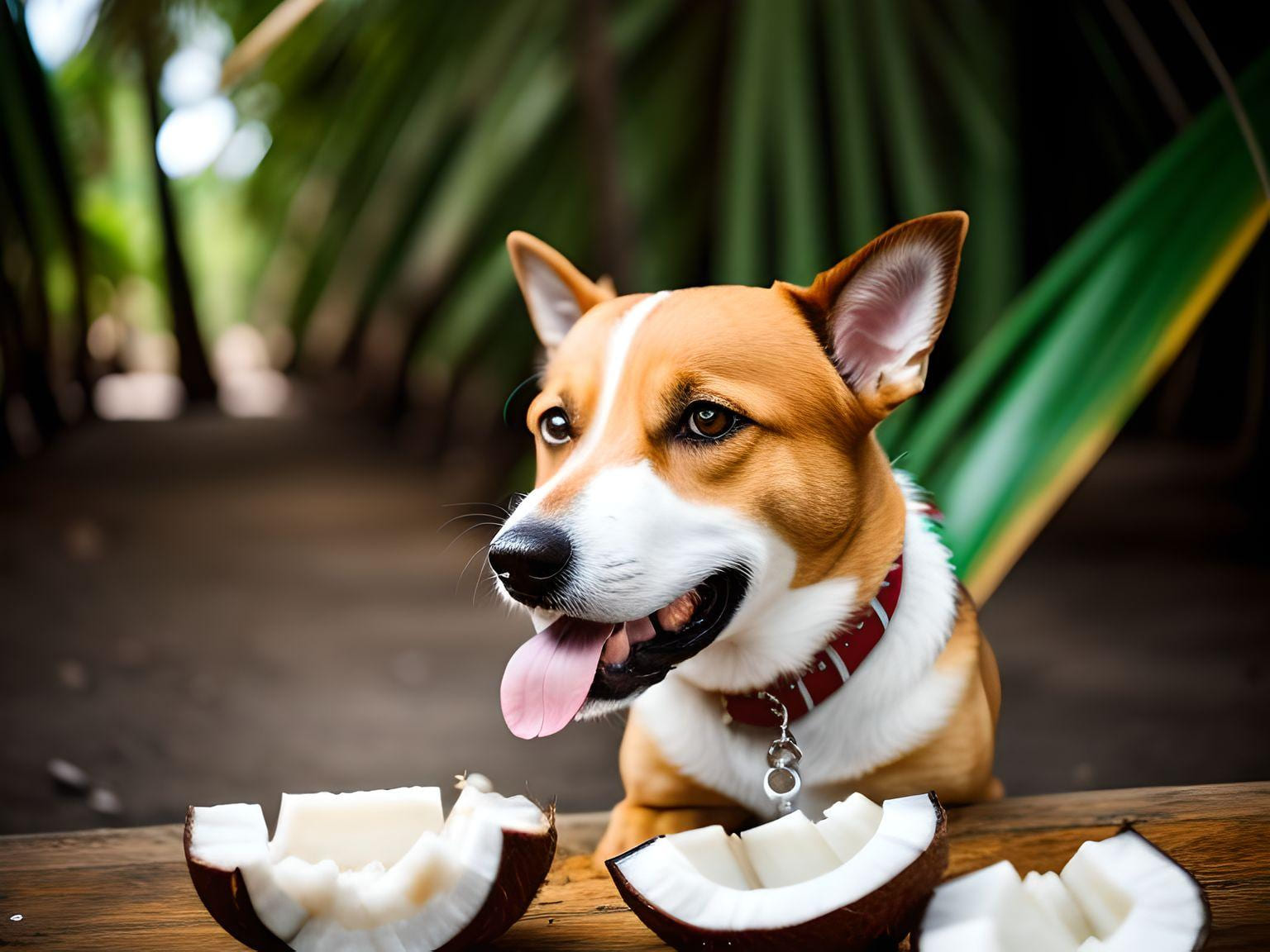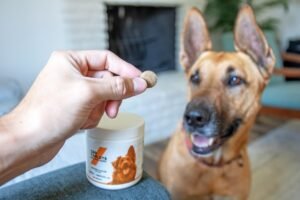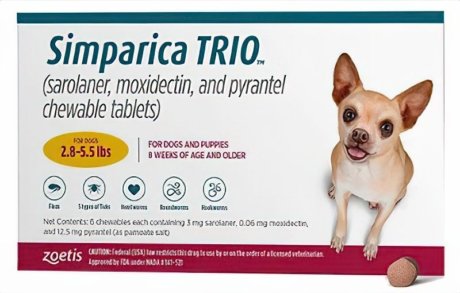Can Dogs Eat Coconut? Health Risks, 5 Benefits, Nutritional Values, Treats
As a responsible dog owner, you want to provide the best nutrition for your furry friend. You may be wondering whether coconut is a safe and healthy addition to your dog’s diet. In this article, we will explore the question “Can dogs eat coconut?” and provide you with all the information you need to make an informed decision about incorporating this tropical fruit into your dog’s meals.
Understanding Coconut and its Nutritional Value

What is coconut?
Coconut is a tropical fruit that is widely known for its versatile uses in the culinary world. It contains three layers: the outer husk, the fibrous shell, and the seed inside, which is the part commonly consumed by humans. This seed, also known as the coconut “meat,” is packed with nutrients that offer various health benefits.
Nutritional content of coconut
Coconut is rich in essential nutrients such as fiber, vitamins C and E, and minerals like potassium and magnesium. Additionally, it contains healthy fats, particularly medium-chain triglycerides (MCTs), which are considered beneficial for human health.

Health benefits for humans
For humans, coconut and its derivatives have been linked to numerous health benefits, including improved heart health, weight management, and better digestion. However, it’s essential to remember that dogs have different nutritional needs compared to humans.
Can Dogs Eat Coconut?
Yes, dogs can eat coconut in moderation. However, it’s essential to remove the tough outer husk and fibrous shell before giving them the coconut meat. Coconut can provide some health benefits, but it should not be a regular part of their diet. Always monitor your dog for any adverse reactions and consult with your veterinarian before introducing coconut to their meals.

Can Dogs Eat Coconut Oil?
Yes, dogs can eat coconut oil in small amounts. Coconut oil can provide some health benefits for dogs, such as improving their skin and coat health. It contains lauric acid, which has antibacterial and antiviral properties. However, it’s crucial to offer coconut oil in moderation, as it is high in fat and excessive consumption can lead to weight gain or gastrointestinal issues.

Can Dogs Eat Coconut Milk?
Dogs can consume coconut milk in small quantities, but it’s essential to be cautious. Some dogs may be sensitive to the lactose in coconut milk, leading to digestive upset. Also, check for added sugars or artificial ingredients, as they can be harmful to dogs. As with any new food, start with small amounts and monitor your dog for any adverse reactions.
Can Dogs Eat Coconut Ice Cream?
While coconut ice cream may sound tempting for dogs, it’s generally not recommended. Most ice creams, including coconut ones, contain high levels of sugar and fat, which can be harmful to dogs and lead to obesity or other health issues. Instead, opt for dog-friendly frozen treats made with safe ingredients.

Can Dogs Eat Coconut Flakes?
Coconut flakes can be safe for dogs in small amounts. However, it’s essential to ensure they are unsweetened and free of any added ingredients like preservatives. Introduce coconut flakes gradually into your dog’s diet, and observe for any signs of allergies or digestive problems.
Can Dogs Eat Coconut Meat?
Yes, dogs can eat coconut meat, but it should be given in moderation. Remove the tough outer husk and fibrous shell before offering them the coconut meat. Coconut meat contains nutrients that can provide some health benefits for dogs, but it should not be a primary food source in their diet.

Can Dogs Eat Coconut Yogurt?
Coconut yogurt can be safe for dogs in small amounts, as long as it does not contain any artificial sweeteners or added sugars. It’s essential to check the ingredients to ensure it’s a dog-friendly option. Like with other coconut products, moderation is key.
Can Dogs Eat Coconut Flour?
Coconut flour is generally safe for dogs when used in small quantities in homemade dog treats or food. However, it is high in fiber, so excessive consumption can lead to gastrointestinal issues. Always use coconut flour in recipes specifically designed for dogs.

Can Dogs Eat Dried Coconut?
Yes, dogs can eat dried coconut in small amounts as an occasional treat. However, dried coconut is calorie-dense and can lead to weight gain if given in excess. Avoid varieties with added sugars or artificial additives.
Can Dogs Eat Coconut Cookies?
Most commercially available coconut cookies are not suitable for dogs because they often contain ingredients like sugar, chocolate, or other harmful additives. It’s best to avoid giving your dog coconut cookies meant for human consumption.
Can Dogs Eat Coconut Shavings?
Coconut shavings can be safe for dogs when they are plain and free of any added flavours or sweeteners. However, moderation is essential, as too many shavings can lead to gastrointestinal upset.
Can Dogs Eat Coconut Shrimp?
No, dogs should not eat coconut shrimp or any other seasoned or fried food meant for human consumption. Shrimp should only be offered to dogs in plain, cooked form, without any breading or added ingredients.
Can Dogs Eat Coconut Water?
Coconut water can be safe for dogs in small amounts, but it should not be a regular part of their diet. Coconut water contains natural sugars, so excessive consumption can lead to weight gain or other health issues. Offer coconut water as an occasional treat and ensure it is free from any added sugars or artificial additives.
Is Coconut Safe for Dogs?
Dogs’ dietary needs
Before adding any new food to your dog’s diet, it’s crucial to understand their dietary requirements. Dogs are primarily carnivorous animals, and their diet should primarily consist of high-quality animal protein.
Potential risks of feeding coconut to dogs
While coconut can be a healthy treat for humans, it may not be suitable for all dogs. Some dogs may experience digestive issues or allergies when consuming coconut. Additionally, coconut has a relatively high-fat content, and overfeeding can lead to weight gain and pancreatitis in dogs.
Health Benefits of Coconut for Dogs
Lauric acid and its benefits
Coconut contains lauric acid, a type of MCT that has antibacterial, antiviral, and antifungal properties. In dogs, lauric acid can potentially help boost the immune system and support overall health.
Improved skin and coat health
Coconut oil can be beneficial for dogs with dry or itchy skin. When applied topically, it may alleviate irritation and promote a healthier, shinier coat.
Boosted immune system
The MCTs in coconut may enhance dogs’ ability to fight off infections and strengthen their immune response.
Different Forms of Coconut for Dogs

Fresh coconut
If you’re considering offering fresh coconut to your dog, ensure that you remove the tough outer husk and fibrous shell. Serve the coconut meat in small, manageable pieces, and watch for any adverse reactions.
Coconut oil
Coconut oil is a popular choice for dog owners looking to provide their pets with the potential health benefits of coconut. It can be administered orally or applied topically to improve skin and coat health.
Coconut water
Coconut water is the liquid found inside a coconut. While it contains some nutrients, it’s essential to offer it in moderation due to its natural sugar content.
Feeding Coconut to Dogs: Dos and Don’ts

Moderation is key
As with any new food, moderation is vital. Introduce coconut gradually into your dog’s diet and monitor their reaction.
How to introduce coconut to your dog’s diet
To introduce coconut to your dog, start with small amounts and observe for any allergic reactions or digestive upset. If your dog tolerates coconut well, you can incorporate it into their diet as an occasional treat.
Foods to avoid
Avoid feeding your dog coconut products that contain added sugars or artificial sweeteners, as these can be harmful to dogs.
Delicious Homemade Coconut Treats for Dogs

1. Coconut and peanut butter bites
Ingredients:
- Coconut flour
- Natural peanut butter
- Coconut oil
Instructions:
- Mix equal parts coconut flour and natural peanut butter in a bowl.
- Add a teaspoon of coconut oil and blend the ingredients until you have a dough-like consistency.
- Roll the mixture into small balls and place them on a baking sheet.
- Refrigerate until firm, and then serve as a tasty and nutritious treat for your dog.
2. Frozen coconut treats
Ingredients:
- Coconut water
- Shredded coconut
Instructions:
- Pour coconut water into ice cube trays.
- Sprinkle shredded coconut into each compartment.
- Freeze until solid, and then offer as a refreshing treat on hot days.
Coconut Oil for Dogs: External Uses

Skin and coat treatments
Coconut oil can be used as a natural moisturizer for dry or irritated skin. Gently massage a small amount of coconut oil into your dog’s skin and coat for added hydration.
Ear cleaning and protection
Coconut oil can also be used to clean your dog’s ears gently. Apply a few drops of coconut oil to a cotton ball and use it to wipe the inside of your dog’s ears.
Conclusion on Can Dogs Eat Coconut:
In conclusion, coconut can be a safe and beneficial addition to your dog’s diet when given in moderation and with consideration of their individual health needs. Coconut oil, in particular, may offer numerous advantages for your dog’s skin and coat health. However, it’s essential to monitor your dog’s reaction and consult with your veterinarian before making any significant changes to their diet.
Frequently Asked Questions on Can Dogs Eat Coconut:
-
Can coconut cause allergies in dogs?
Yes, some dogs may be allergic to coconut. Monitor your dog for any adverse reactions after introducing it to their diet.
-
Is coconut safe for puppies?
It’s best to consult your veterinarian before introducing coconut to a puppy’s diet to ensure it’s safe and appropriate.
-
How much coconut can I give my dog?
The amount of coconut you can give your dog depends on their size and individual dietary needs. Always start with small portions and observe how they react.
-
Can I use coconut oil to soothe my dog’s itchy skin?
Yes, coconut oil can be applied topically to help alleviate dry and itchy skin in dogs.
-
Are there any breeds that should avoid coconut?
While most dogs can tolerate coconut in moderation, it’s essential to be cautious if your dog has a history of allergies or sensitivities to new foods.
-
Is coconut milk safe for dogs?
While coconut milk may be safe in small quantities for some dogs, it is essential to check for any added sugars or artificial additives, as these can be harmful. It’s best to consult with your veterinarian before offering coconut milk to your dog.
-
Can coconut help with my dog’s bad breath?
Coconut oil’s antimicrobial properties may contribute to improved oral health, which could help reduce bad breath in dogs. However, it’s crucial to address the underlying cause of bad breath with your veterinarian.
-
Are there any side effects of feeding too much coconut to dogs?
Yes, feeding excessive amounts of coconut can lead to digestive upset, including diarrhea or vomiting. Additionally, the high-fat content in coconut can contribute to weight gain and pancreatitis if not given in moderation.
-
Can I give my dog coconut treats every day?
While coconut treats can be a tasty and nutritious occasional treat, it’s best not to give them daily. Moderation is key to avoid any potential health issues related to excessive coconut consumption.
-
Can dogs eat coconut cake or desserts?
It’s generally not recommended to feed dogs coconut cakes or desserts meant for human consumption. These often contain additional ingredients, such as sugar and artificial sweeteners, that can be harmful to dogs.
Recommended related to Can dogs eat coconut:
Top 10 Cutest Dog Breeds (2023) | Adorable Furry Companions
Top 10 Cute Puppy Dogs Breed in 2023 | A Loyal and Adorable Companion
Can Dogs Eat Bananas: 8 Benefits, Health Risks, Care Tips, Precautions





























